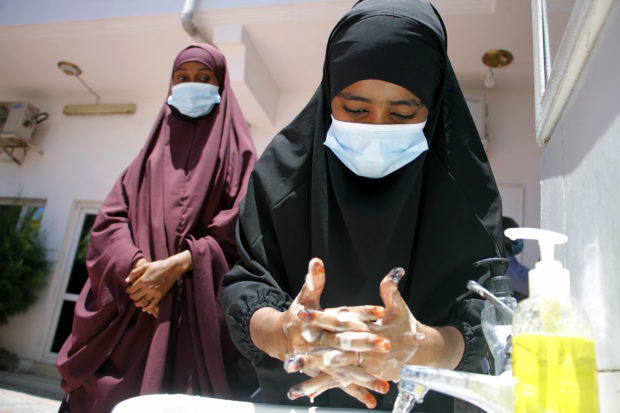Africa sees ‘extremely rapid evolution’ of pandemic, UN says
JOHANNESBURG — More African countries closed their borders Thursday as the coronavirus’ local spread threatened to turn the continent of 1.3 billion people into an alarming new front for the pandemic.

Somali female wash their hands during coronavirus awareness training conducted by the local paramedics and doctors in Somali capital Mogadishu, Thursday, March, 19, 2020. Somalia’s government has announced the closure of schools universities and a ban or large gathering and events for two weeks effective. For most people, the new coronavirus causes only mild or moderate symptoms such as fever and cough and the vast majority recover in 2-6 weeks but for some especially older adults and the people with existing health issues, the virus that causes COVID-19 can result in more severe illness, including pneumonia.(AP Photo/Farah Abdi Warsameh)
Africa is seeing an “extremely rapid evolution,” the World Health Organization’s regional chief, Dr. Matshidiso Moeti, told reporters.
Thirty-six of Africa’s 54 countries now have cases, with the total over 720. Chad and Niger announced their first cases Thursday. The first case in sub-Saharan Africa was announced Feb. 28, less than three weeks ago.
Moeti said she did not believe that large numbers of infected people are going undetected but acknowledged a shortage of testing kits. Forty-three countries have testing capability, up from two when the outbreak began. By Monday, countries will have 60,000 testing kits.
The WHO regional chief also expressed concern about travel restrictions and their impact on the ability to deliver needed resources. The WHO is considering humanitarian corridors, Moeti said.
But many African nations were taking their cue from China and other countries by sharply restricting travel.
Article continues after this advertisementOn Thursday, Senegal closed its airspace. Angola and Cameroon shut air, land and sea borders. Rwanda blocked all commercial flights for a month.
Article continues after this advertisementThe island nation of Mauritius closed its border after announcing its first case.
Some people in other countries clamored for their governments to block flights, too.
“To stop this virus once and for all is to stop any flight that will land to (Nairobi’s international airport). Let them stop,” said Uhuru Evans, a bus driver in the capital of Kenya, East Africa’s economic hub.
He offered hand sanitizer to passengers as they boarded.
“Since it was announced that it has reached Kenya, I am refusing to take customers to the airport,” said Peter Muteru, a taxi driver. “It has reached a point where I carry only people I know.”
South Africa, where the number of cases jumped to 150 from 116, said it would install a new fence on both sides of its main border post with economically shattered Zimbabwe to keep infected people from crossing into either country undetected. South Africa has the most cases in sub-Saharan Africa. Zimbabwe has reported none.
“We must protect our citizens and fellow Africans,” Public Works Minister Patricia de Lille said. The new fence will stretch some 12 miles (19 kilometers) on either side.
Some African nations also began cracking down on alcohol sales to help prevent the coronavirus’ spread among crowds of patrons. South Africa said all places that sell alcohol for drinking on site must close from 6 p.m. to 9 a.m.
In Uganda, President Yoweri Museveni declared that “drunkards sit close to one another. They speak with saliva coming out of their mouth. They are a danger to themselves.”
Elsewhere, Mauritania announced a curfew from 8 p.m. to 6 a.m. and closed restaurants and cafes, another trend likely to spread on the continent.
And the head of the Africa Centers for Disease Control and Prevention, Dr. John Nkengasong, warned that simply being tested shouldn’t end anyone’s concerns.
“If you are tested today, it doesn’t mean you aren’t infected tomorrow,” he told reporters.
Meanwhile, a day after the U.S. Embassy in Ethiopia issued a security alert about reports of attacks on foreigners accused of having the virus, that country’s government appealed for calm.
“COVID-19 is not related to any country or nationality,” the office of Nobel Peace Prize-winning Prime Minister Abiy Ahmed said. “It is a test against all humanity.”
Hours later, the U.S. Embassy in Cameroon said Americans and other foreigners in the major cities of Yaounde and Douala reported “verbal and online harassment, stone throwing and banging on vehicles occupied by expatriates.”
GSG
For more news about the novel coronavirus click here.
What you need to know about Coronavirus.
For more information on COVID-19, call the DOH Hotline: (02) 86517800 local 1149/1150.
The Inquirer Foundation supports our healthcare frontliners and is still accepting cash donations to be deposited at Banco de Oro (BDO) current account #007960018860 or donate through PayMaya using this link.